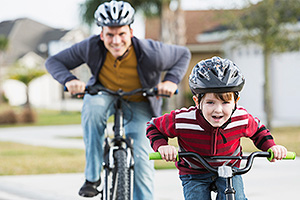Quick Tips: Helping Your Child Stay Safe and Healthy
Get started
Raising children is a big job. It can be overwhelming to think about all the things your child needs to learn to stay safe and healthy.
In addition to teaching children good eating and activity habits, you can also teach them some basic health and safety habits.
Remember that your child learns habits by watching you. If you and the rest of your family follow healthy habits, your child will learn them from you. And if you have bad habits, your child will learn those too.

Good general habits for a healthy life
Help your children learn to:
- Think. Children need to learn that actions have consequences. They need to learn the difference between fantasy and reality. Before your children act, encourage them to stop, take a breath, and think about the consequences.
- Talk openly. Encourage your children to talk about what is bothering them.
- Relax. Learn relaxation skills, and teach them to your children.
- Eat well. Encourage your children to learn about and enjoy healthy foods.
- Be active. Help your children find physical activities and hobbies they enjoy. Limit TV, video games, and computer time.
Preventing illness
Kids get dirty. They play with other kids who may be sick. Teaching them the following habits will keep them healthier:
- Wash your hands each time you use the toilet, after you blow your nose, and before you eat.
- Don't share hats, combs, toothbrushes, or other personal items with other children.
- Cover your mouth when you cough or sneeze.
- Don't touch other children's blood, urine, stool, or other body fluids.
Good safety habits
The world can be a dangerous place. But you can teach your children habits that will help keep them safer:
- Don't chase or bother pets, especially when they are eating, sleeping, or with their babies.
- Ask first if it's okay to pet someone's dog, and then let the dog smell your hand before you pet it.
- Always wear a seat belt.
- Wear a helmet when biking, snowboarding, skating, or skiing.
- Never swim alone.
- Know how to call 911 or other emergency help.
- Be careful around strangers. Know when and how to stay away from them.
- If you get lost, ask for help right away.
- Don't cross the street alone or without permission.
- Don't play in the driveway or around cars.
- Don't play with guns. Parents should keep all guns locked up. Lock up ammunition separately.
Dealing with peer pressure
Peer pressure is powerful. Your children likely will get to know others their age who use drugs or alcohol, who smoke, or who take part in dangerous behaviors like driving too fast. Your child will have an easier time dealing with peer pressure if he or she has learned some good habits.
Teach your children to:
- Spend time with friends who don't use drugs or alcohol or do dangerous activities.
- Skip parties where they know there will be drugs or alcohol or dangerous behavior.
- Practice responses, such as "No, thanks. I've got too much to do today," "My parents told me that they would ground me for 3 weeks if I do that, and I don't want to take the chance of missing my friend's party," or "I think that's a bad idea."
- Get involved in drug-free, safe activities and learn ways to ask their friends to join too.
- Call for a ride if they're in trouble or feel pressured by others to use drugs or alcohol or take part in dangerous activities. Your children should know that you want to help, no matter what the situation is.
- Know the signs of an unhealthy relationship and talk to someone they trust if they feel threatened or uncomfortable in a relationship.
Safer sex
Talking about sex can be awkward, but the earlier you start the discussion, the better prepared your child will be to make safer decisions about it. The best time to begin the discussion about sex is when your child is in elementary school.
Teens need to learn healthy habits if they are sexually active. For example:
- Don't have sex until you're ready, physically and emotionally.
- Always use protection. Know the different types of protection that are available.
- Ask a potential sex partner about his or her sexual history and about high-risk behaviors like drug use, anal sex, and sex in exchange for money or drugs.
Related Information
- Dealing With Today's Teen Issues
- Fitness: Getting and Staying Active
- Growth and Development, Ages 11 to 14 Years
- Growth and Development, Ages 12 to 24 Months
- Growth and Development, Ages 15 to 18 Years
- Growth and Development, Ages 2 to 5 Years
- Growth and Development, Ages 6 to 10 Years
- Health and Safety, Ages 2 to 5 Years
- Healthy Habits for Kids
- Helping Kids Handle Peer Pressure
- Stress Management
- Talking With Your Child About Sex
Credits
Current as of: October 24, 2024
Author: Ignite Healthwise, LLC Staff
Clinical Review Board
All Ignite Healthwise, LLC education is reviewed by a team that includes physicians, nurses, advanced practitioners, registered dieticians, and other healthcare professionals.
Current as of: October 24, 2024
Author: Ignite Healthwise, LLC Staff
Clinical Review Board
All Ignite Healthwise, LLC education is reviewed by a team that includes physicians, nurses, advanced practitioners, registered dieticians, and other healthcare professionals.



